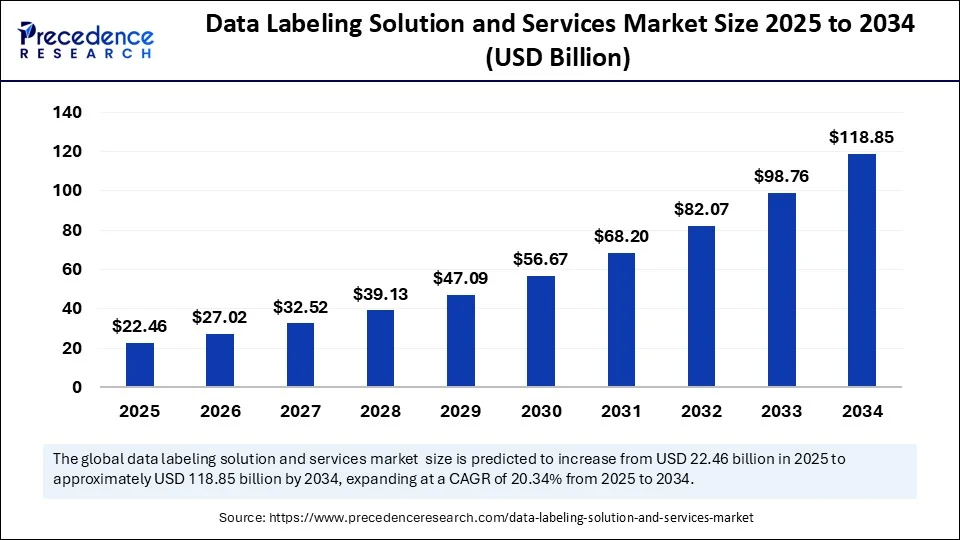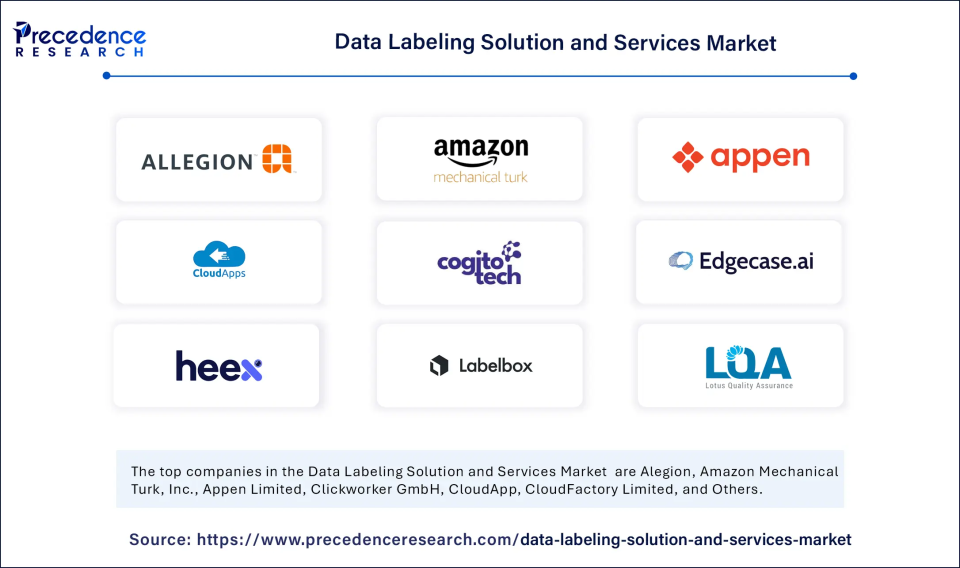
Data Labeling Solution and Services Market Key Highlights
-
The global data labeling solution and services market was valued at USD 18.66 billion in 2024 and is anticipated to reach USD 118.85 billion by 2034, growing at a robust CAGR of 20.34% from 2025 to 2034.
-
Asia Pacific held the largest market share of 35% in 2024, dominating the global landscape.
-
North America is projected to experience the fastest growth throughout the forecast period.
-
Based on sourcing type, the outsourced segment accounted for the largest share at 85% in 2024, while the in-house segment is expected to register the highest CAGR in the years ahead.
-
By type, the image/video segment led the market with a 37% share in 2024, whereas the audio segment is forecasted to grow at the fastest pace.
-
In terms of labeling type, the manual segment held a dominant share of 76% in 2024, while the automatic segment is set to grow at the highest CAGR between 2025 and 2034.
-
Among verticals, the IT sector generated the highest market share in 2024, while the automotive sector is poised for notable growth in the coming years.
Data Labeling Solution and Services Market Growth Factors
Several core factors are fueling this growth. First, the exponential increase in unstructured data—such as images, videos, voice recordings, and text—requires sophisticated labeling before it can be used to train AI models. Second, industry-specific applications of AI in fields like healthcare, automotive, and retail are driving demand for highly accurate and domain-specific annotation. Third, as governments and regulatory bodies implement stricter policies on data transparency, bias mitigation, and algorithmic accountability, companies are investing in better-structured datasets to comply with such standards.
Lastly, the emergence of large language models and multimodal AI systems has created a need for highly diversified and massive datasets, often requiring human validation at scale, opening up more market space for data labeling solutions.
AI Role in the Data Labeling Solution and Services Market
Artificial Intelligence itself plays a growing role in improving the efficiency of data labeling. AI-enabled platforms can pre-label data through automated processes that are then verified or corrected by human annotators. This hybrid approach—known as human-in-the-loop—greatly reduces the time and cost involved in generating labeled datasets. Machine learning algorithms also assist in active learning workflows, where only the most informative or uncertain samples are sent for human review, maximizing annotation efficiency.
Additionally, reinforcement learning techniques are now being used to optimize how tasks are distributed among annotators, enhancing quality control and throughput. In quality assurance, AI helps flag inconsistencies or disagreements in annotations, allowing for faster corrections and higher data integrity. These developments are turning data labeling from a manual, labor-intensive process into a semi-automated, intelligent workflow that scales more effectively with project size.
Regional Outlook
-
Asia‑Pacific commanded the largest share (~35 % in 2024) thanks to abundant multilingual workforces, surging autonomous‑mobility pilots, and aggressive AI investment in China, South Korea, and India.
-
North America is forecast to post the fastest growth as hyperscalers, generative‑AI labs, and federal agencies upscale multimodal datasets under strict AI‑risk‑management rules.
-
Europe maintains steady demand, bolstered by GDPR‑aligned secure‑labeling hubs in Eastern Europe and rising emphasis on ethical, bias‑audited data curation.
-
Latin America and Middle East & Africa are emerging annotation destinations, leveraged for Spanish‑ and Arabic‑language labels and benefiting from government digital‑economy incentives.
Segmental Insights
Sourcing Type: Outsourced services dominate, yet in‑house teams are the fastest‑growing slice among Fortune‑1000 firms building proprietary data flywheels for strategic moat.
Data Type: Image/video leads (> 37 % share), underpinned by computer‑vision use cases; audio and text labeling are surging as voice assistants and large‑language models proliferate.
Labeling Technique: Manual annotation still rules (≈ 76 % share), but automatic and semi‑automatic methods are logging the steepest CAGR, riders on the AI‑assisted‑labeling wave.
Vertical: IT & telecom tops revenue; automotive and healthcare show breakout growth as autonomous and diagnostic AI races intensify.
Market Scope
| Report Coverage | Details |
| Market Size by 2034 | USD 118.85 Billion |
| Market Size in 2025 | USD 22.46 Billion |
| Market Size in 2024 | USD 18.66 Billion |
| Market Growth Rate from 2025 to 2034 | CAGR of 20.34% |
| Dominating Region | Asia Pacific |
| Fastest Growing Region | North America |
| Base Year | 2024 |
| Forecast Period | 2025 to 2034 |
| Segments Covered | Sourcing Type, Type, Labeling Type, Vertical, and Region |
| Regions Covered | North America, Europe, Asia-Pacific, Latin America, and Middle East & Africa |
Market Drivers
The strongest market drivers include the proliferation of AI across industries and the growing importance of data governance and compliance. As businesses deploy production-scale AI systems, especially in autonomous driving, medical imaging, voice assistants, and real-time financial monitoring, the need for labeled training data becomes ongoing rather than one-time. Furthermore, the increasing demand for personalized and predictive experiences in consumer-facing applications requires regularly updated and context-rich datasets.
Regulatory frameworks such as GDPR, CCPA, and the EU AI Act are also putting pressure on organizations to ensure that the data feeding their models is traceable, unbiased, and well-documented—making structured labeling workflows essential. Additionally, cloud service providers and MLOps vendors are integrating labeling tools into broader AI development pipelines, making data labeling a more accessible and integral part of AI adoption.
Opportunities
Significant opportunities are emerging within the data labeling market. The integration of synthetic data and real-world data labeling presents a high-value opportunity for rare or complex use cases like self-driving car edge cases or rare medical conditions. Specialized industries such as biotechnology and pharmaceuticals also present opportunities for medical-grade labeling, which commands premium pricing due to the expertise and regulatory compliance required.
The growth of edge AI in robotics and augmented reality devices introduces a need for near-real-time micro-labeling, prompting the development of ultra-fast labeling platforms. There is also room for innovation in sustainable AI practices, where smaller, well-curated datasets are used to minimize computing costs while maintaining model performance. This opens the door for companies that can provide “smart labeling” solutions to differentiate themselves in an increasingly competitive market.
Challenges
Despite rapid growth, the market faces several challenges. Ensuring data quality at scale is a persistent issue, as noisy or inconsistent labels can significantly degrade model performance. As the scale of datasets increases, balancing cost with quality becomes more difficult. Ethical concerns around the labor force used for labeling—often located in low-cost regions—are also gaining attention, prompting calls for fair wages and better working conditions. As automation technologies improve, there is also growing concern over the commoditization of basic labeling tasks, which could reduce margins for companies offering manual annotation services.
Another challenge is data sovereignty, where regional laws require that data be processed and stored locally, complicating global projects. Additionally, for high-security industries like defense and biotech, concerns about intellectual property and data leakage may lead organizations to prefer in-house solutions over third-party services.
Data Labeling Solution and Services Market Companies

- Alegion
- Amazon Mechanical Turk, Inc.
- Appen Limited
- Clickworker GmbH
- CloudApp
- CloudFactory Limited
- Cogito Tech LLC
- Deep Systems, LLC
- edgecase.ai
- Explosion AI GmbH
- Heex Technologies
- Labelbox, Inc.
- Lotus Quality Assurance
- Mighty AI, Inc.
- Playment Inc.
- Scale AI
- Shaip
- Steldia Services Ltd.
- Tagtog Sp. z o.o.
- Trilldata Technologies Pvt Ltd
- Yandez LLC
Read Also: Hydrogen Internal Combustion Engines Market
You can place an order or ask any questions, please feel free to contact at sales@precedenceresearch.com |+1 804 441 9344